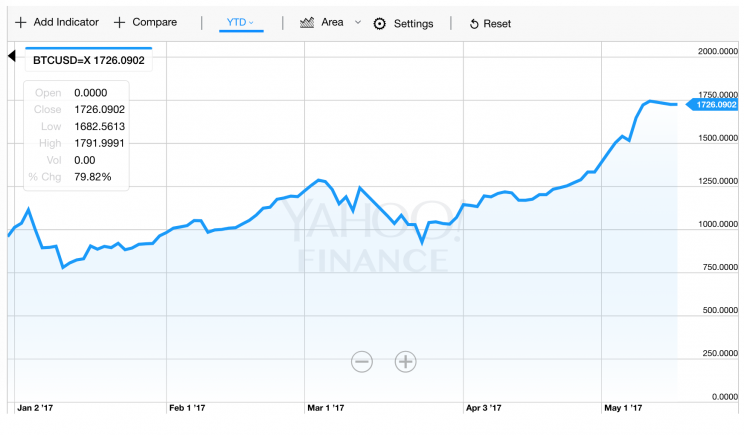4 reasons why bitcoin keeps hitting new highs
The price of the digital currency bitcoin is chugging toward $2,000. It’s up 60% in the past month and 320% in the past year. It hits a new all-time high every few days.
Bitcoin is flying, and if you’re a cryptocurrency newbie, you might be wondering why.
There are always multiple explanations for bitcoin price hikes—it’s almost never one single source. Here are four of the factors contributing to the current wild ride.
1. Japan (and Russia too)
On April 1, Japan officially recognized bitcoin as a legal form of payment; just over a month later, the coin is still seeing a price benefit from that news. The decision means that bitcoin exchanges in Japan will be regulated under anti-money-laundering (AML) and know-your-customer (KYC) frameworks.
Charts from CryptoCompare show that 46% of bitcoin trading activity right now is happening in the Japanese yen, more than the activity in any other currency (normally No. 1 is either the US dollar or Chinese yuan), which supports the notion that Japan’s law is the biggest factor stoking the bitcoin price now.
In addition, Bloomberg reported on April 10 that Russia aims to do the same in 2018—its central bank is working with its government to legitimize and regulate digital currency.
Yes, there’s an irony to the fact that legitimacy and regulation would boost the bitcoin price, considering that many of the early bitcoin believers got involved in the space specifically because of its anti-government, anti-regulation appeal. This philosophical push and pull continues to play out in the bitcoin world, especially as Wall Street types and financial institutions gravitate toward blockchain technology.

2. Bitcoin fork / Litecoin
The bitcoin blockchain, the decentralized ledger that records all bitcoin transactions, has slowed down in the last year under the weight of heavy transaction volume. What that means is the speed in which it processes “blocks” (bundles of transactions) has slowed. At some times, transactions are taking two hours to go through—still much faster than international money transfers through traditional wire services like Western Union, but far slower than the bitcoin blockchain used to run.
The problem has led to an internal debate in the bitcoin world (so heated that many have called it a bitcoin “civil war”) over how to raise the block size allowed on the bitcoin blockchain and also decrease lag time. The likely result of the debate will be a “fork” to bitcoin’s code—the blockchain would split into two chains with different software and rules. The premise is called a “hard fork.”
While that debate has caused price fluctuations, recently a much smaller digital currency, litecoin (market cap: $1.6 billion vs. bitcoin’s $29 billion), successfully pulled off its own “soft” fork by enacting a proposal called “segregated witness.” It’s a workaround where transactions are split up into a form where they appear smaller to the ledger (and thus more of them can be processed at a time) without having to overhaul the software. After the success of the litecoin fork, there is some renewed optimism around a bitcoin fork and that has helped buoy the price.
3. BATS appeal to the SEC
After the SEC’s harsh rejection of a Winklevoss bitcoin ETF in March, the price of bitcoin tumbled after a steady rise. But at the end of March, the Bats global exchange, where the Winklevoss brothers seek to list their bitcoin fund (under the ticker COIN), filed an appeal to the SEC, which will soon rule on that appeal.
This means that the Winklevoss bitcoin ETF may get off the ground after all, and some believe that is contributing to the current price hike, albeit to a lesser extent than Japan and litecoin.
4. Growing legitimacy of digital currency + uncertainty in mainstream market
The one factor always at play when the bitcoin price is rising quickly is also the simplest: general market uncertainty. Digital currency is seen by many as a safe haven investment class when a country’s fiat currency or economy is unstable. People turned to bitcoin during Greece’s banking crisis; people turned to bitcoin when China cracked down on capital controls. Because of this trend, Donald Trump’s presidency is thought to be a boon to bitcoin; the price is up more than 90% since he took office.
However: it isn’t the case that bitcoin only rises when there’s uncertainty. That is: if the mainstream market is doing well, that doesn’t mean digital currency can’t also thrive. Rather, bitcoin is an uncorrelated asset.
Nick Tomaino, an investor who spent two years at bitcoin wallet company Coinbase and now writes a bitcoin blog, prefers this explanation above all others for bitcoin’s ongoing ride: simple longevity. The longer bitcoin is around, the more seriously investors take it. And indeed, bitcoin’s mainstream legitimacy is at a high point right now.
“As distrust in institutions across the world increases,” Tomaino says, “people will gravitate towards [bitcoin]… interest will compound and so will price.”
This story was first published on May 10, and was updated on May 19.
Disclosure: The author owns less than 1 bitcoin, purchased in 2015 for reporting purposes.
—
Daniel Roberts is a writer at Yahoo Finance, covering fintech and sports business. Follow him on Twitter at @readDanwrite.
Read more:
Bitcoin is becoming the new gold
More than 75 banks are now on Ripple’s blockchain network
America’s big banks are staffing up—for blockchain

 Yahoo Finance
Yahoo Finance 
